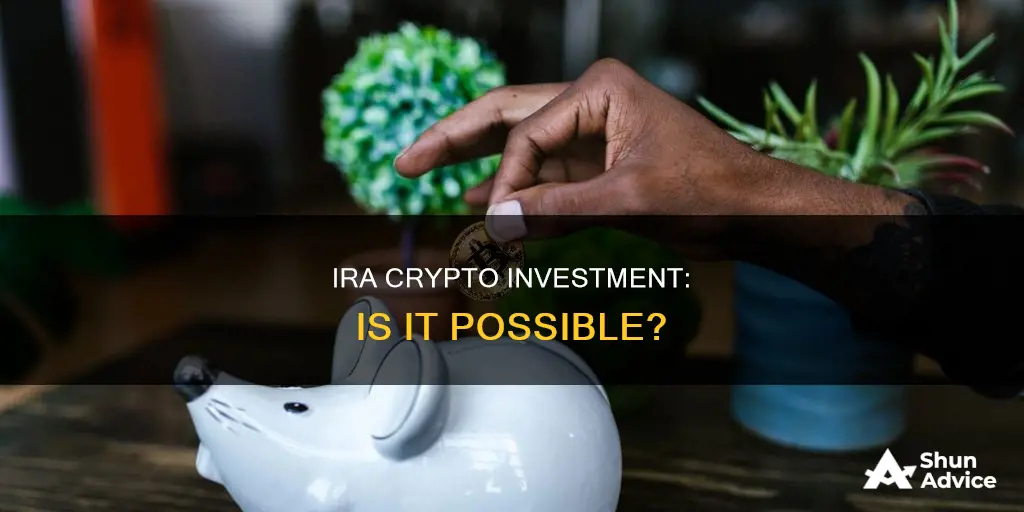
Investing in cryptocurrencies like Bitcoin through an Individual Retirement Account (IRA) is possible, but it is generally not recommended due to the associated risks and complexities. To do so, you would need a self-directed IRA, which allows for alternative investments that are typically not permitted in traditional IRAs, such as real estate or commodities. However, self-directed IRAs are considered risky and expensive to maintain, even without the inclusion of cryptocurrencies.
Cryptocurrencies are highly volatile and speculative, making them a potentially risky addition to a retirement portfolio. The extreme price swings and uncertain regulatory environment of cryptocurrencies could lead to significant losses, especially for those nearing retirement.
Additionally, there are strict rules from the Internal Revenue Service (IRS) regarding prohibited investments in IRAs. Self-directed IRAs require careful compliance with these rules, as any violations could result in the loss of tax-deferred status for the account.
Furthermore, finding a custodian who can manage crypto assets within an IRA can be challenging, and the fees associated with crypto IRAs tend to be high.
While a Bitcoin IRA may offer tax advantages and portfolio diversification, it is important to carefully consider the risks and complexities involved before investing in cryptocurrencies through this vehicle.
| Characteristics | Values |
|---|---|
| Possibility | It is possible to invest in cryptocurrency in an IRA through a self-directed IRA. |
| Expert opinion | Experts generally warn against investing in cryptocurrency through a self-directed IRA. |
| Reasons for warning | Self-directed IRAs are not widely available, are risky and expensive to maintain, and come with strict rules from the IRS. |
| Crypto-specific risks | Cryptocurrency is volatile and speculative, and investors need to be comfortable with extreme price swings and potentially losing their entire investment. |
| Additional considerations | The possibility of further cryptocurrency regulation and the potential for fraud are also important to consider. |
| Advantages of Bitcoin IRAs | Diversification, potential returns, and tax advantages. |
| Disadvantages of Bitcoin IRAs | Additional fees, crypto exchange limitations, price volatility, retirement planning complexity, and no tax-loss harvesting. |
| Steps to open a Bitcoin IRA | Choose a custodian, open a self-directed IRA, fund the IRA, purchase Bitcoin, and store your Bitcoin securely. |
What You'll Learn

Crypto IRAs can diversify your portfolio and eliminate capital gains taxes
Crypto IRAs can be a great way to diversify your portfolio and eliminate capital gains taxes. Here's how:
Diversification
Crypto IRAs allow you to hold alternative assets like cryptocurrencies, alongside traditional investments in your retirement portfolio. This diversification can help protect your retirement accounts in the event of a major market downturn or other economic turmoil. For example, cryptocurrencies can hedge against inflation, similar to other alternative investments.
Tax Advantages
Including cryptocurrencies in your IRA can help you avoid heavy capital gains taxes. With a Roth IRA, for instance, you can realize any capital gains without being taxed since you've already paid taxes on the funds in the account. On the other hand, with a regular IRA, you pay income taxes when you make a withdrawal, which could be advantageous if your income and tax bracket are reduced after retirement.
Long-Term Growth Potential
Some investors believe that cryptocurrencies will continue to grow in popularity and accessibility in the future. IRAs are an excellent vehicle for long-term investments with significant growth potential over decades.
However, it's important to remember that investing in cryptocurrencies through an IRA also comes with certain drawbacks and risks. These include:
- Volatility and Risk: Cryptocurrencies are highly volatile and carry significant risk. For example, Bitcoin has experienced significant price fluctuations, making it unsuitable for someone approaching retirement who needs stable and liquid assets.
- Fees: Crypto IRAs often come with various fees, including setup fees, custody fees, trading fees, and annual maintenance fees. These fees can be substantial and eat into your potential gains.
- Regulatory Uncertainty: The classification of cryptocurrencies by tax authorities could change in the future, potentially impacting their eligibility for inclusion in IRAs.
- Fraud and Security: The SEC has warned about the potential for fraud in self-directed IRAs, including crypto IRAs. Additionally, the decentralized nature of cryptocurrencies means that investors could lose their entire investment if their accounts are hacked.
Strategies for Investing in Crypto with Limited Capital
You may want to see also

Crypto IRAs are only available through specialised custodians
Crypto IRAs are self-directed IRA crypto accounts that allow investors to hold alternative assets, like cryptocurrencies, alongside traditional investments in their retirement portfolio.
Since the IRS does not recognise any specific IRA designed for cryptocurrencies, crypto IRAs are only available through specialised custodians. These custodians are equipped to track and manage the storage and security of digital assets. Banks and other financial institutions act as custodians for conventional IRAs, while specialised crypto custodians are used for crypto IRAs.
Some popular custodians that offer crypto investment options include Bitcoin IRA, BitIRA, and Equity Trust Company. It is important to note that crypto IRAs come with additional fees, such as set-up fees, transaction fees, and annual account management fees.
Additionally, crypto IRAs introduce substantial risk to retirement portfolios due to the volatile nature of cryptocurrencies. As a result, they may not be suitable for individuals approaching retirement who need stable and liquid assets.
Before investing in a crypto IRA, it is recommended to consult with a certified financial advisor familiar with cryptocurrencies to ensure a comprehensive understanding of the risks and potential benefits.
Smart Ways to Invest Your 50 Bitcoins
You may want to see also

Crypto IRAs are subject to additional fees
For example, setting up a self-directed IRA account for trading can cost several thousand dollars in charges during the initial setup, and there are also recurring custody and maintenance fees. Each cryptocurrency trade incurs fees from the service provider's trading partner and custodian. A typical provider may charge 3.5% per transaction per purchase and 1% or a flat fee for each sale.
Additionally, IRA custodians working with cryptocurrency must be prepared to take on additional reporting duties with the IRS, which could result in even more fees for crypto IRA investors. It's important to carefully research and understand the fee structure of any crypto IRA provider you're considering to ensure you're aware of all the potential costs involved.
Furthermore, crypto IRAs often have higher fees than traditional IRA providers. For instance, iTrust Capital, a crypto IRA platform, charges a 1% fee on crypto transactions, while traditional IRA providers typically don't charge such high fees for stock or bond trades.
When considering a crypto IRA, it's crucial to weigh the potential benefits against the additional fees and risks involved. Crypto IRAs can provide diversification and the potential for significant growth, but they also come with higher costs and volatility. It's always a good idea to consult a certified financial advisor familiar with cryptocurrencies and IRAs to ensure you make an informed decision.
The Crypto Coin Investment Guide: Best Picks
You may want to see also

Crypto IRAs are not suitable for risk-averse investors
The volatile nature of cryptocurrencies makes them a risky investment, particularly for those approaching retirement. Crypto IRAs may be more suitable for younger investors with a longer time horizon who can withstand potential downturns in the market. Additionally, cryptocurrencies are not backed by businesses or tangible assets, and their value is based primarily on market belief and sentiment. This further contributes to the speculative nature of crypto investments.
Furthermore, crypto IRAs often come with higher fees compared to traditional IRAs. Initial setup fees, custody fees, trading fees, and annual maintenance fees can be significantly higher for crypto IRAs, potentially negating any tax advantages offered by the account.
Overall, while crypto IRAs can provide diversification and exposure to the cryptocurrency market, they are not suitable for risk-averse investors due to the high volatility, speculative nature, and higher fees associated with these types of accounts.
The Little Guy's Guide to Bitcoin Investing
You may want to see also

Crypto IRAs can be complex to set up
While it is possible to invest in cryptocurrency in an IRA, the process can be complex and may involve multiple steps. Here are some key considerations and steps to help you understand the process of setting up a Crypto IRA:
Understanding Crypto IRAs
There is no specific Individual Retirement Account (IRA) recognized by the Internal Revenue Service (IRS) for cryptocurrencies. When people refer to a "Crypto IRA" or "Bitcoin IRA," they are referring to an IRA that allows you to include cryptocurrencies within its portfolio of holdings. These accounts are often managed by custodians who specialize in cryptocurrency trading and offer additional security and insurance services.
Choosing a Provider
It is important to select a reputable company that offers Crypto IRA services. Examples of companies in this space include iTrustCapital, Bitcoin IRA, BitIRA, and Equity Trust. These companies provide different features such as low fees, robust security measures, and easy account setup. It is recommended to compare their services, fees, and security measures before making a decision.
Account Setup
The account setup process will vary depending on the provider you choose. Generally, you will need to provide personal information, such as a government-issued ID, and authorize the transfer of funds from your existing retirement account or make a new contribution. Some providers may also require you to work with a digital currency specialist or customer service representative to complete the setup process.
Trading and Holding Crypto
Once your account is set up, you will be able to trade and hold cryptocurrencies. The process of buying and selling cryptocurrencies will depend on the platform you choose. Some platforms offer 24/7 trading, while others may have specific trading interfaces or requirements. It is important to understand the trading process, associated fees, and any restrictions imposed by the provider.
Security and Storage
The security and storage of your cryptocurrencies is a critical aspect of Crypto IRAs. Some providers offer cold storage options, where your digital assets are stored offline in secure facilities. Others may utilize encryption and multi-factor authentication to protect your assets. It is essential to understand the security measures and insurance protection offered by your chosen provider.
Fees and Charges
Crypto IRAs often come with various fees, including setup fees, trading fees, custody fees, and annual maintenance fees. These fees can vary significantly between providers, so it is important to review their fee structure before signing up. Additionally, each cryptocurrency trade may incur additional fees from the service provider and their partners.
In conclusion, setting up a Crypto IRA can be complex due to the specialized nature of cryptocurrency investments and the regulatory environment surrounding IRAs. It is important to carefully consider your options, understand the risks and fees associated with these accounts, and seek guidance from a certified financial advisor, especially one familiar with cryptocurrencies.
Gold Coin Investment: Best Buys for Your Money
You may want to see also







